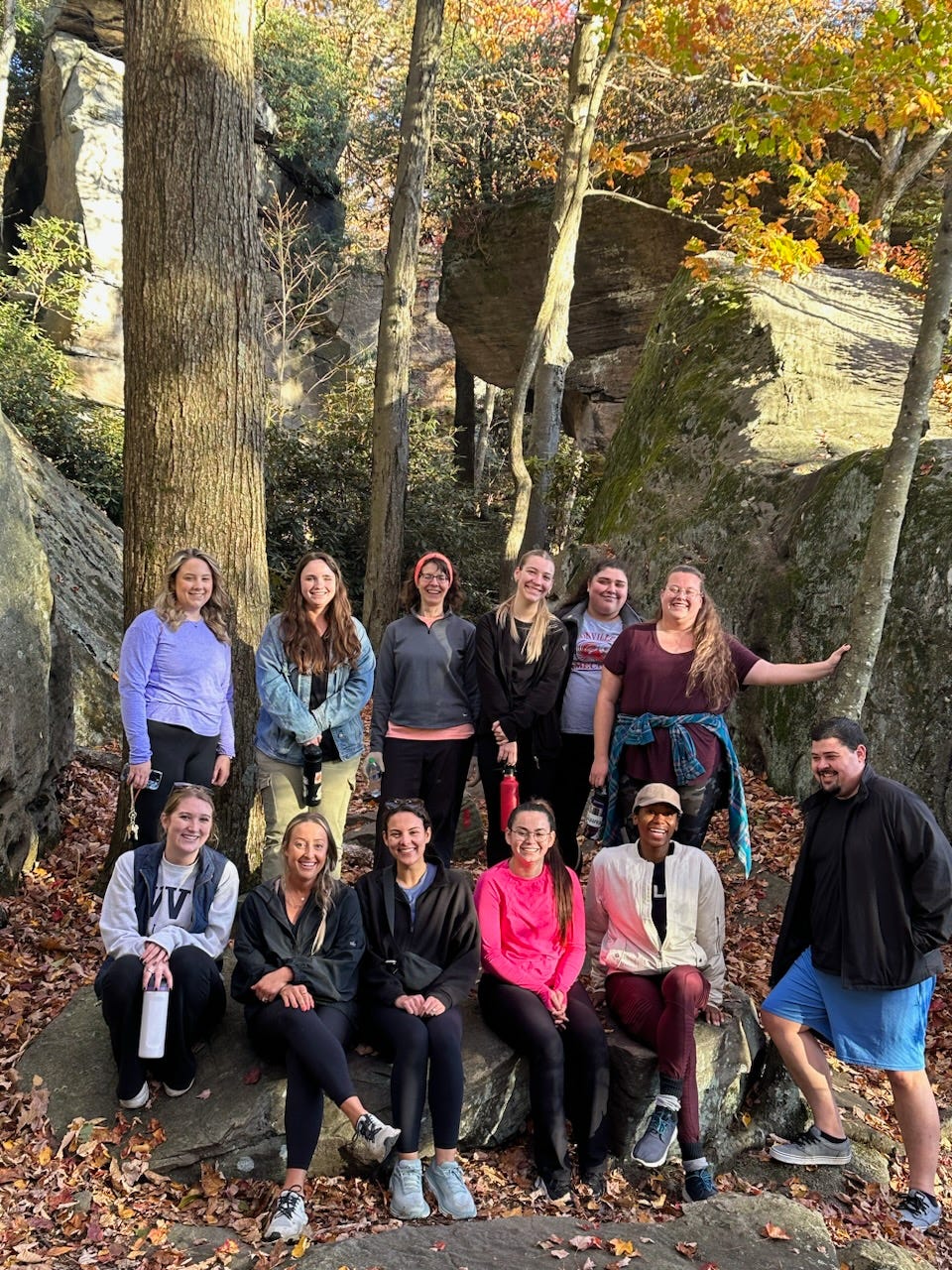Immigration Law Students Take Wellness Seriously (But Not Too Seriously)
Hearings, hassles, and hiking with the WVU Immigration Law Clinic

In the legal profession these days, we talk a pretty good game about self care: rest, exercise, community, mindfulness, and all the other things that research shows contribute to (1) happiness and (flowing from that) (2) success. But we don’t always model what we preach.
With studies suggesting that asylum lawyers have the highest burnout rates of any profession surveyed, we’ve made a point to change that in the WVU Immigration Law Clinic. In most of our weekly class meetings, students learn about best practices in lawyering such as oral and written advocacy, negotiation, agency practice, and client-centered approaches. But we also have a class devoted to mindfulness practices and, once a year, a day of recreation, exercise, and team-building at Coopers Rock State Forest.
Yesterday was the perfect day for a hike — sunny, clear, and mild. The fall foliage in Northern West Virginia is nearing its peak. You can round a bend in the road and find yourself startled speechless by a canvas of apricot, vermillion, cranberry, and amber. Students and attorneys in our clinic spent the afternoon scrambling over rocks, losing the trail, finding it again (thanks, Skye), and sharing some post-hike spiced popcorn trail mix.
Graduating “Practice-Ready” Immigration Attorneys
I’m incredibly proud of this team and what they’ve accomplished already this year. With such a small immigration law bar in our state, the ILC trains students to represent clients in all types of immigration matters, from removal defense to employment-based visa applications and everything in between. We’re fortunate to have an unusually robust clinical program at WVU Law: in the ILC, students earn 10 credits over two semesters, allowing teams to take on bigger cases and a more varied case load than would be possible in programs offering only a few credits in one semester.
With remote work on the rise, immigration law offices in other states have even begun to reach out about hiring WVU ILC students because they graduate “practice-ready.” While we’re excited to bring more immigration legal representation to clients in West Virginia, remote work arrangements also create options for our students who want to practice specific types of immigration law but don’t want to move out of state.
Just a Typical Week for the WVU Immigration Law Clinic
ILC students, all in their final year of law school, take the lead in developing and handling their cases: interviewing clients; developing case theories and task maps; researching and briefing legal arguments; advocating with agency personnel. In addition to our weekly class meetings, students meet each week with a supervisor (me or attorney Lesley Yost) to describe their case strategies and theories, raise questions, and troubleshoot issues. Apart from being present in court or at agency interviews to supervise student performance, attorneys operate entirely behind the scenes during the academic year, intervening only when needed. We aim to give students the type of experience they’ll find when they’re fully licensed attorneys next year — but with an experienced attorney reviewing their work and offering a safety net (just in case).
Here’s a sampling of the work ILC students did just this week:
One team appeared before the U.S. Immigration Court for a Master Calendar Hearing. The clients have developed great trust and confidence in their student team and were delighted when the court scheduled their merits hearing for a date when the current team will still be available to represent them.
Another student team met with researchers from a human rights nonprofit and explored how the organization’s data will help to establish that their client was a member of a “particular social group” that has been targeted in the client’s home country.
One group researched ways to accomplish international service of process on a parent in another country where the client’s security is at risk.
One team received their client’s DACA renewal documents and monitored how litigation in the Fifth Circuit, including re-argument two weeks ago, might affect the client’s future options.
Several groups kept trying (and trying) to contact someone from the State Department or the United Nations International Organization for Migration to help expedite family reunification for Afghan asylees with family members in especially high risk situations — families who have now been separated for more than three years since the evacuation.
Kicking Off the Immigrant Justice Corps Program in West Virginia
I’m especially proud to announce that our first fellow in the Immigrant Justice Corps - Unaccompanied Child Program, Taylor Smith Backus, was admitted to the West Virginia bar on Tuesday (congratulations, Taylor!). In the meantime, Taylor outlined a case strategy for seeking asylum on behalf of children who arrived as unaccompanied minors, and advised a family from Ukraine about potential relief such as Temporary Protected Status and renewal of parole.
Taylor is one of three IJC-UCP fellows in West Virginia this year, along with WVU ILC alumnus Matthew Regan at Mountain State Justice and Laken Scott at ChildLaw Services. Taylor, Matt, and Laken will primarily represent children who arrived as unaccompanied minors and were released from the custody of the Office of Refugee Resettlement. These three fellowships significantly expand the number of immigration attorneys in West Virginia and will help ensure that children don’t have to go before the U.S. immigration courts or agencies without an attorney. We’re working to get the word out to eligible kids, their sponsor families, and entities like churches and schools that come into contact with them.
If you or someone you know would like to inquire about the services of the WVU Immigration Law Clinic, you can call (304) 293-7249 or email us at cliniclaw@mail.wvu.edu.


